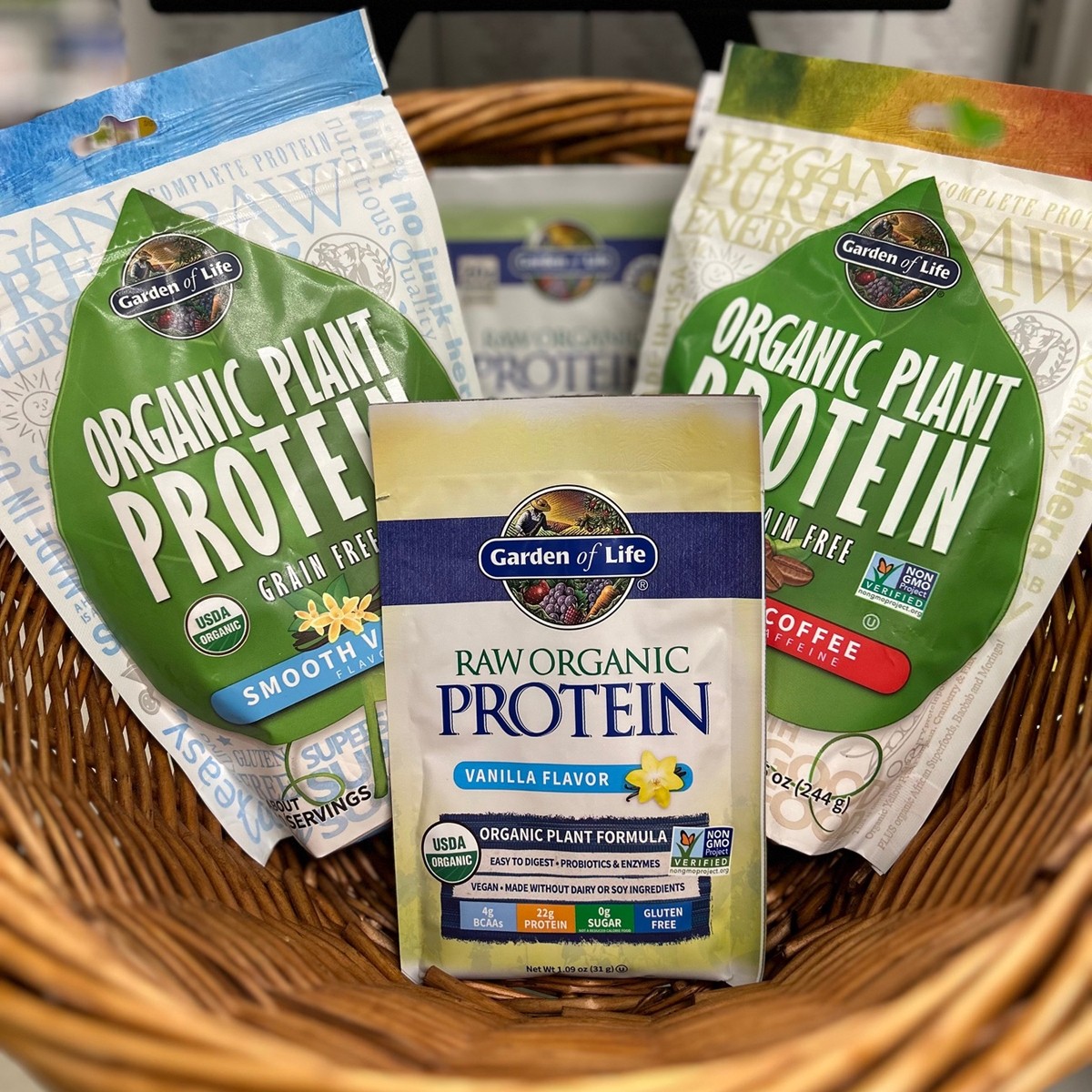Plant-based protein powders are a convenient and sustainable way to help meet daily protein needs. Many protein powders come in a ready-to-go shake form that can be added to water or your choice of milk and shaken up for a delicious, quick protein option. Protein powders can also be added to juice, smoothies, or a liquid of your choice - though you will want to take care of what flavors you mix. Instructions for mixing are including on the packaging of powders. Plant based proteins can be considered a more sustainable option because plant grown sources can be quickly replenished for a sustainable source of protein.
The human body requires twenty amino acids to operate, eleven of which the body can produce. The other nine amino acids are called 'essential amino acids' that must be sourced from the diet. In addition to providing your body protein, protein powder supplementation can help you meet your essential amino acid quota. The nine essential amino acids are tryptophan, threonine, isoleucine, leucine, lysine, methionine+cystine, phenylalanine+tyrosine, valine, and histidine - which you will often see on the sides of protein powder containers.
This post explores the different types of plant-based protein and highlights the benefits of each. All of the proteins listed here are gluten free.
Pea Protein
Derived from split peas, pea protein is a popular choice among plant-based protein. Peas are ground into a powder and then the protein is separated from the starches and fiber.
- Essential Amino Acids: Pea protein contains all nine essential amino acids, but does fall a little short on the amount of methionine+cysteine it provides. However, brown rice protein does contain enough methionine+cysteine. By taking just a little extra pea protein powder you can acheive the same muscle protein synthesis as whey protein. In one study, people took 25 grams of pea protein or whey protein twice a day and both groups achieved identical increases in biceps muscle thickness.
- Easy Digestion: Pea protein is generally gentle on the digestive system. It is well-tolerated by many, making it suitable for those with sensitive stomachs or digestive issues. No reported gas or bloating has occured with pea protein.
- Nutrients: Pea protein is high in iron, which is especially important if you have a vegetarian or vegan diet.
- Sustainable: Since it is made from pea, which recycle nitrogen into the soil and grow quickly this source of protein can be considered quite sustainable!
Brown Rice Protein
Brown rice protein is the star of plant-based protein powders, and for good reason. It is available on it's own as well as in protein mixes. Rice protein powder is made by treating ground up rice with an enzyme that separates the starch from the protein. Most of the fiber has been stripped from brown rice protein powder.
- Essential amino acids: Brown rice protein contains all nine essential amino acids. This makes it an excellent choice for supporting muscle recovery and overall health. It has been shown that using rice or whey protein post-workout provides equally positive gains in muscle thickness, body composition, and upper- and lower-body strength. It does fall a little short on lysine, but you can get adequate lysine by supplementing pea protein or spirulina
- Hypoallergenic: Brown rice protein is hypoallergenic, making it suitable for individuals with food sensitivities or allergies. Brown rice allergy is extremely rare. It provides an alternative for those who cannot consume other common protein sources like soy or dairy.
- Digestive Support: With its gentle nature, brown rice protein is gentle on the digestive system and can be easily tolerated by individuals with sensitive stomachs or digestive issues. Sprouted or fermented brown rice protein is even more digestible and its nutrients more bioavailable. Rice protein is not known to make people gassy or bloated.
- Smooth texture and flavor: The texture is less chalky and gritty than other powders, and the flavor is more familiar. Brown rice protein is a great option for baking, and works great in smoothies.
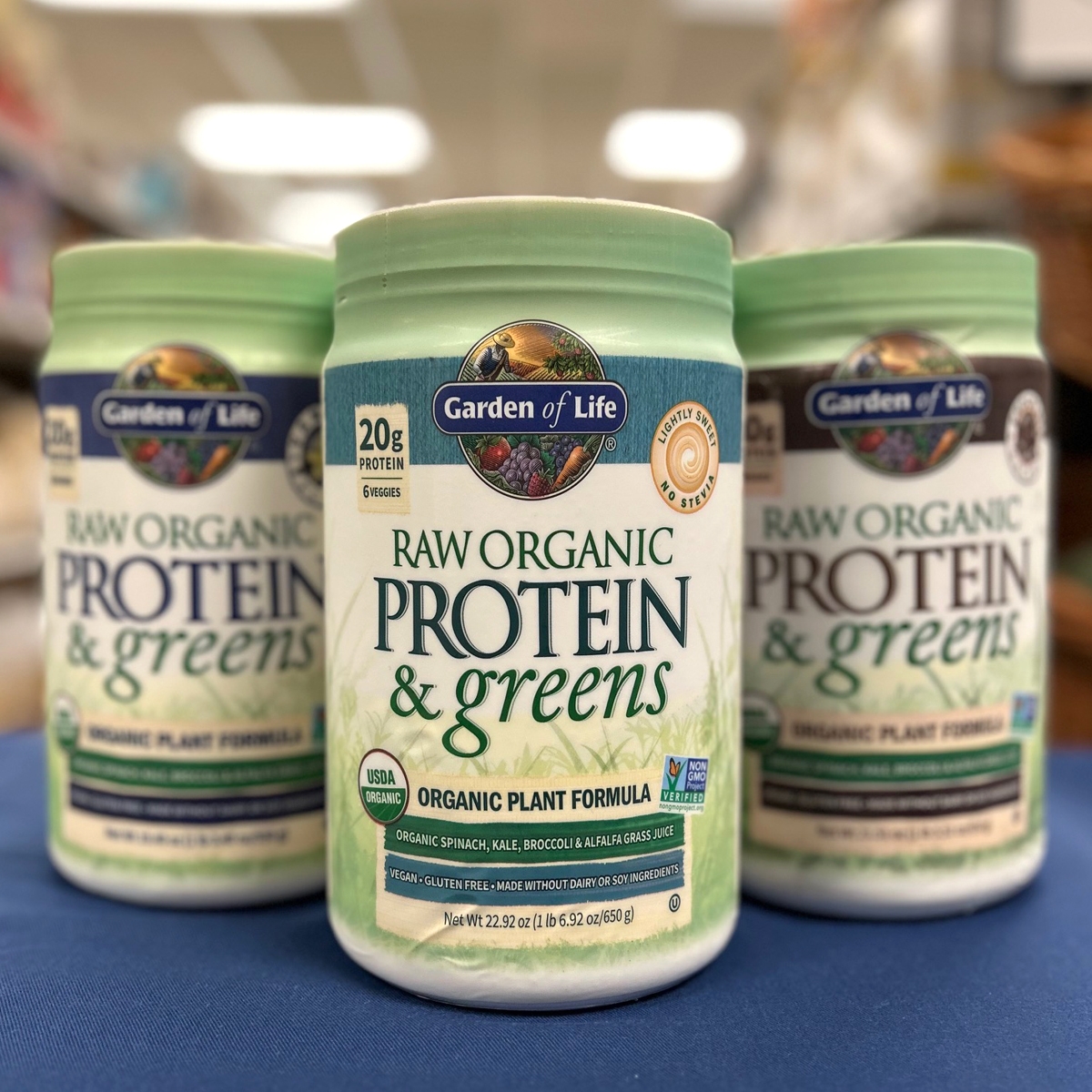
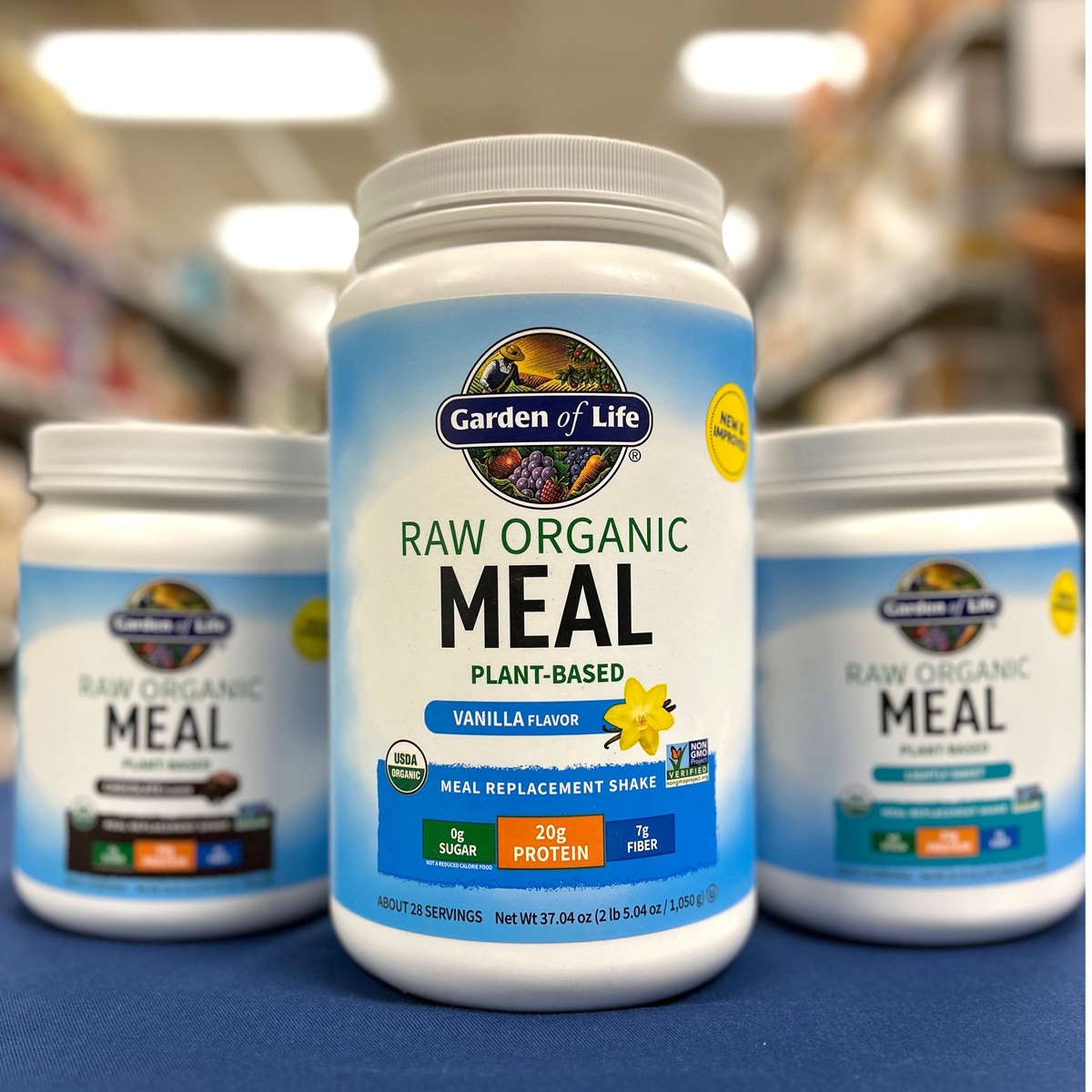
Garden of Life Protein and Greens contains pea protein, sprouted brown rice protein and chia protein. Raw meal contains pea protein and sprouted brown rice protein. These products include both pea protein and brown rice protein which helps to balance the deficits of methionine+cysteine and lysine respectively. Garden of Life protein products also include a variety of sprouted grains and seeds in their protein blends.
Soy Protein
Soy protein is a well-known plant-based protein derived from soybeans. Soy is one of the top eight allergenic foods even though it is found in many processed foods. It is important to pay attention to whether your body can tolerate it. Soy protein is found in many mainstream protein mixes, drinks, and bars.
Soy has some controversy around it, primarily around its phytoestrogen content and how it may affect hormones. However, sprouting or fermenting soy potentially decreases the levels of phytoestrogens present in it!
- High Protein Content: Soy protein is known for its high protein content, providing all essential amino acids necessary for muscle repair and growth.
- Heart Health: Soy protein is heart-friendly as it may help lower cholesterol levels and reduce the risk of heart disease.
Hemp Protein
Hemp protein is derived from the seeds of the cannabis plant and is highly regarded for its nutritional profile and sustainability. Hemp protein is available on it's own as well as in protein mixes. It is made by extracting the oil from hemp seeds and then processing the remaining seed meal into a powder.
- Protein with Fiber: Hemp protein contains all nine essential acids but is low in a couple of them, including leucine and lysine. However, when combined with brown rice or pea protein it adds a powerful punch. It is rich in soluble and insoluble fiber, which aids in digestion and satiety. As far as meal replacement, hemp protein is a superior choice because it offers fiber.
- Omega-3 and 6Fatty Acids: Hemp protein is one of the few plant-based protein sources that naturally contains omega-3 fatty acids.
- Sustainable and Eco-Friendly: Hemp is a fast-growing plant that requires minimal resources, making it a sustainable and environmentally friendly protein source.
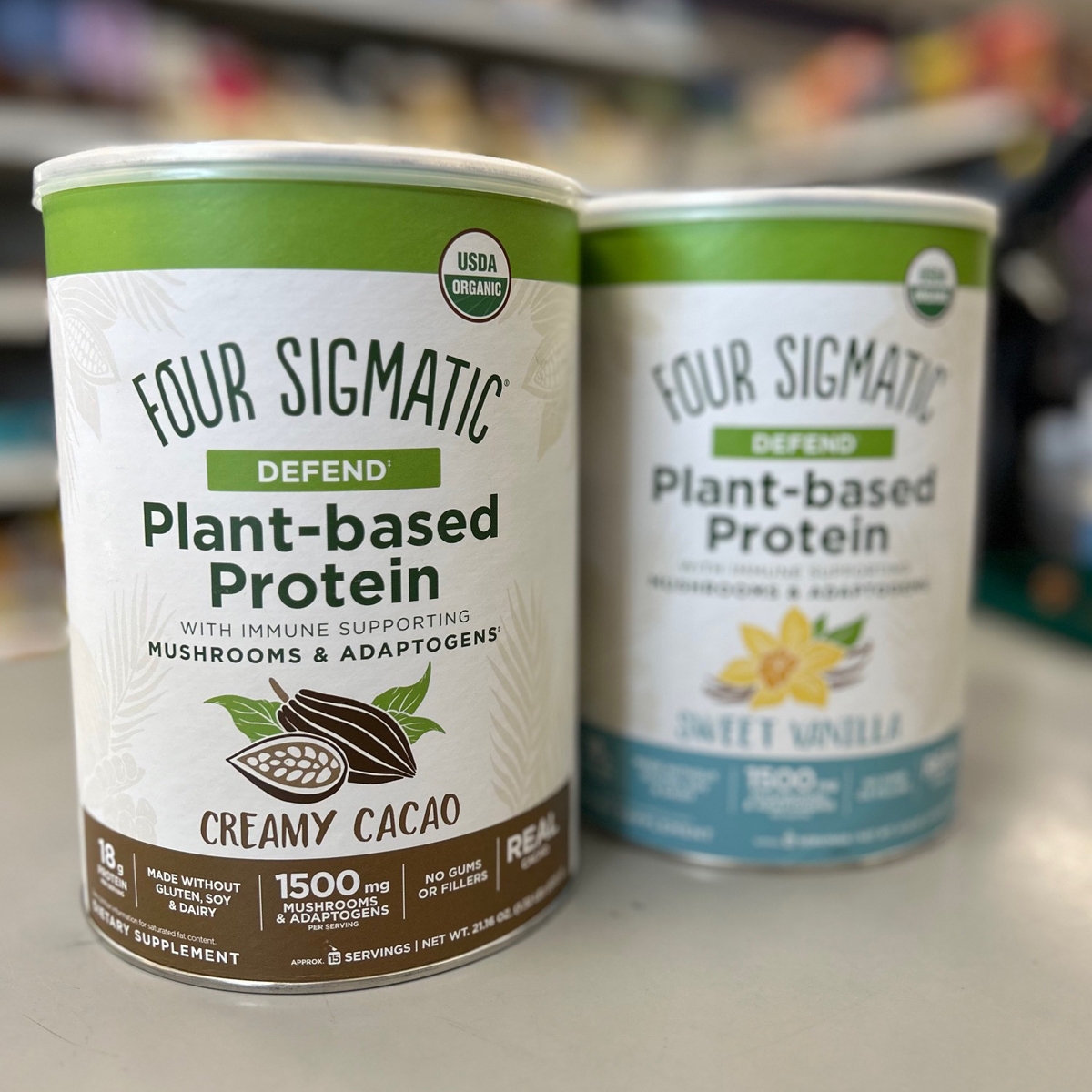
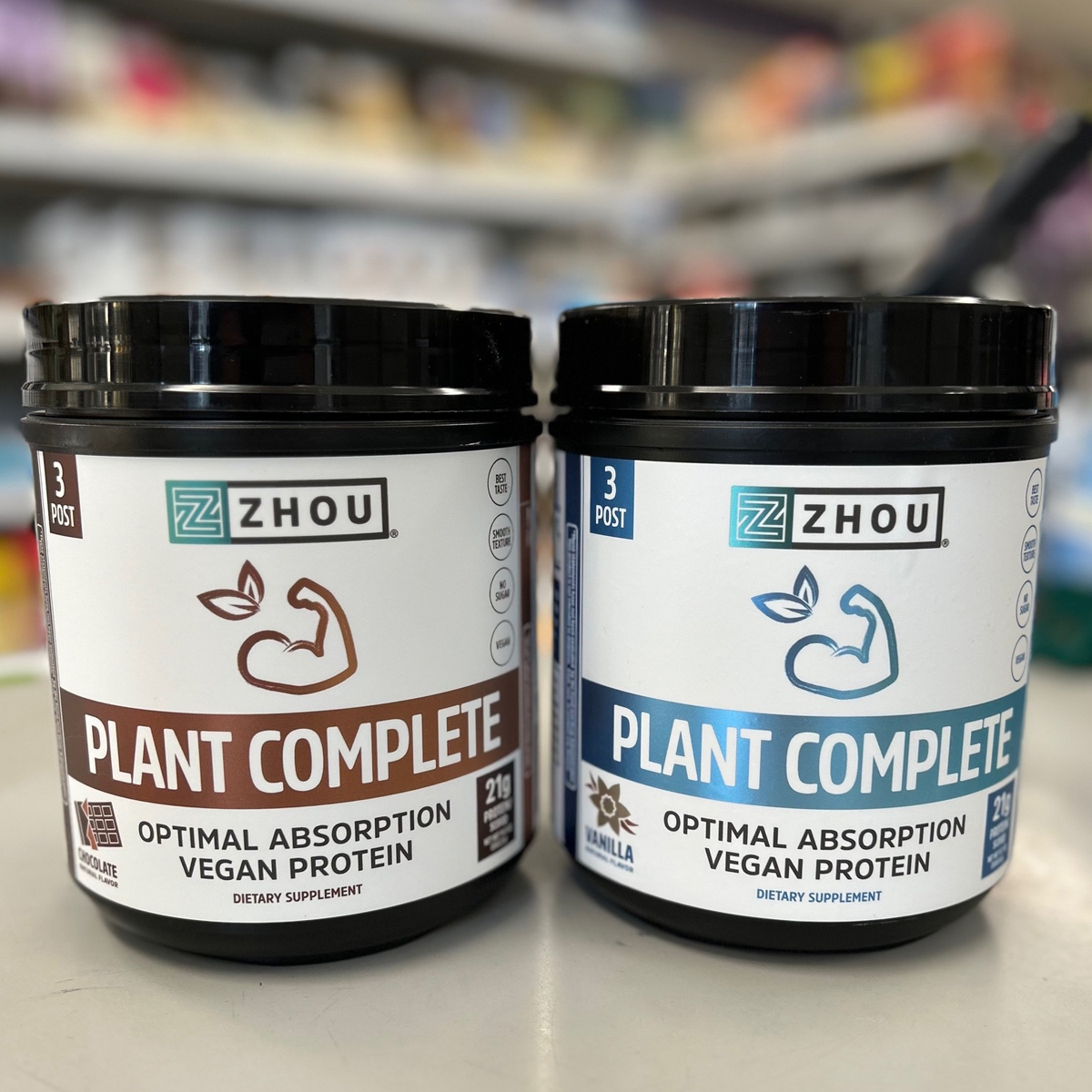
Four Sigmatic plant-based protein includes pea protein, coconut protein, pumpkin protein, hemp protein, and chia protein. Zhou Plant Complete contains pea and brown rice protein.
Chia Protein
Chia seeds come from a flowering plant in the mint family in Central America. Chia seeds are not available as a protein isolate, but is included in some protein mixes.
-
Amino Acidds with Fiber: Like Hemp seeds, Chia protein contains all nine essential amino acids that the body needs for proper functioning as well as dietary fiber.
-
Omega-3 Fatty Acids: Chia seeds are one of the best plant-based sources of omega-3 fatty acids, specifically alpha-linolenic acid (ALA).
-
Nutrient Density: Chia seeds are packed with essential nutrients, including calcium, magnesium, phosphorus, and antioxidants. While chia protein may not provide the same concentration of these nutrients as the whole seeds, it still contributes to the overall nutrient profile.
More Seeds
Brown rice and pea protein products are generally isolates, which means they are processed to enhance protein content while leaving out some of the plant. Another way to get a lot of plant protein, fiber and nutrients is to utilize seeds - as you can see from the details on hemp and chia seeds above. Seed protein powders are generally made from finely grinding the seed meal.
Ancient Nutrition is all about whole food nutrition and uses seeds in their protein products. This is what they say about their Ancient Nutrition Plant Protein: "With a protein base made from superfood seeds like pumpkin, flax, hemp, chia, sunflower, watermelon and sacha inchi – which provide protein and fatty acids – this protein is packed with powerful ingredients that are hard to get in your everyday diet. And none of the isolates, grains or legumes or other processed ingredients you’ll find in most plant-based protein powders."
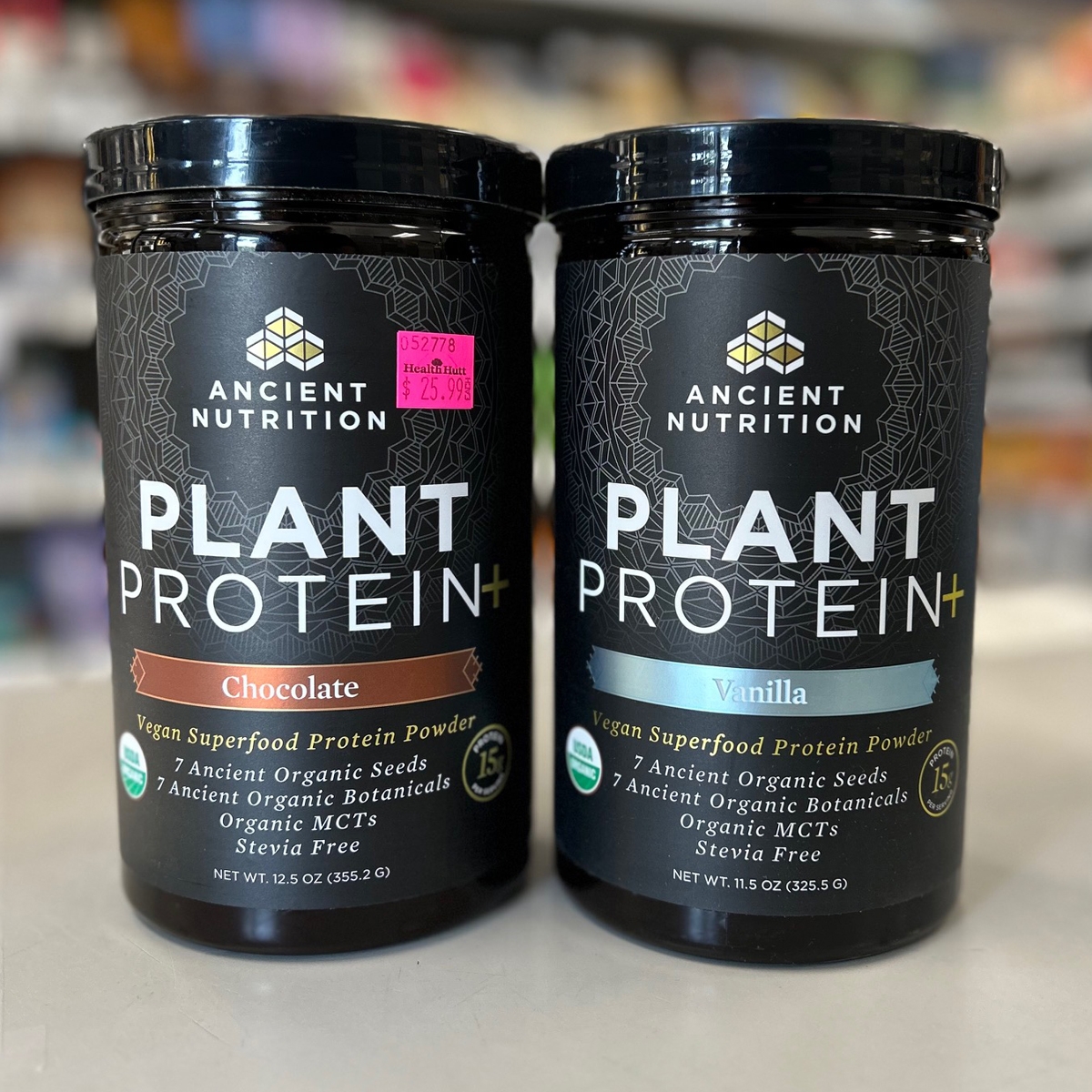
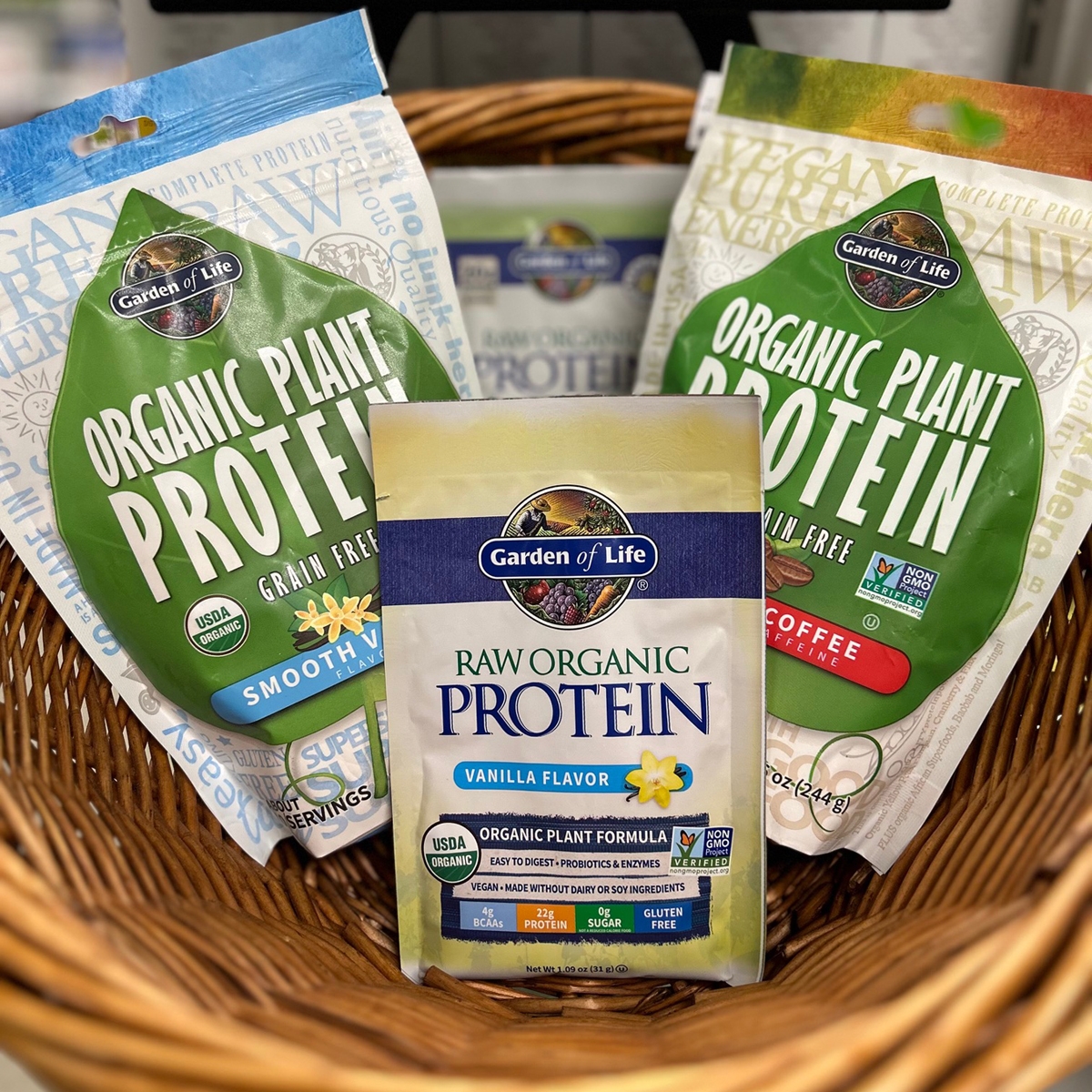
Ancient Nutrition Plant Protein is sourced from seeds: pumpkin seed, flaxseed, hemp seed, chia seed, sunflower seeds, sacha inchi seed.
More Protein Rich Add-ons
Spirulina and chlorella are rich in protein and contain essential amino acids. They are also good sources of vitamins and minerals.
Other grains such as amaranth, buckwheat, millet, and quinoa are utilized in protein mixes.
Other legumes such as lentil, garbanzo, and navy bean are sometimes utilized in protein mixes.
Conclusion
Depending on your goals and needs, you may want to use a mix of protein and muscle-building powders and mixes that include nutrient packed ingredients along with protein powders. Plant based protein powders are on par with the benefits of whey protein and animal-based products. If you cannot tolerate whey or dairy products, there is certainly a plant-based protein powder out there for you. If you use whey protein all the time, maybe you will like mixing in a few plant based powders to mix it up or provide an extra nutrient boost in your diet!
Sources
"Benefits of Brown Rice Protein Powder". Sunwarrior, 24 October, 2019. https://sunwarrior.com/blogs/health-hub/benefits-rice-protein-powder
Wuebben, Joe. “The Complete Guide to Rice Protein Powder.” Onnit Academy, 15 April 2019, www.onnit.com/academy/the-complete-guide-to-rice-protein-powder/.
Wuebben, Joe. “The Complete Guide to Pea Protein Powder.” Onnit Academy, 11 June 2020, www.onnit.com/academy/pea-protein-powder/.
Wuebben, Joe. “Hemp Protein Powder: Everything You Need To Know” Onnit Academy, 4 Oct 2017, www.onnit.com/academy/hemp-protein/.
Callaway, J. C. (2004). Hempseed as a nutritional resource: An overview. Euphytica, 140(1-2), 65-72.
Anderson, J. W., et al. (1995). Meta-analysis of the effects of soy protein intake on serum lipids. New England Journal of Medicine, 333(5), 276-282.
Messina, M., et al. (2010). Soy protein, isoflavones, and cardiovascular health: an American Heart Association Science Advisory for professionals from the Nutrition Committee. Circulation, 121(10), 1142-1150.
